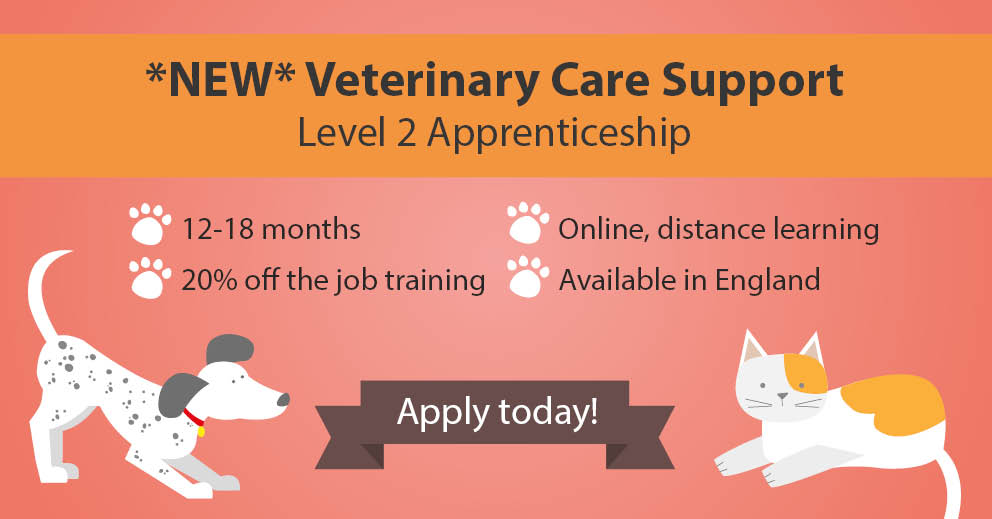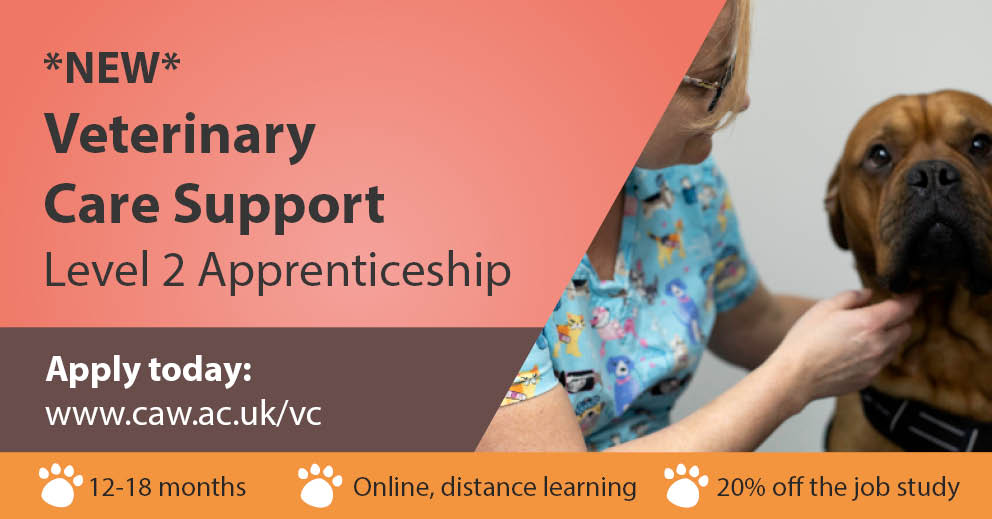Course Overview
Quick Facts
- 12 – 18 months (at least six hours per week of your time must be spent undertaking off-the-job training)*
- Available in England
- Online, Distance Learning: No college attendance required
*12 month minimum period to complete the eportfolio and any applicable functional skills and a maximum period of 6 months to complete the EPA.
Train in Veterinary Care Support
Veterinary Care Support (VCS) professionals are essential members of today’s modern veterinary practice, working alongside veterinary surgeons and veterinary nurses to provide vital nursing care to small animal patients. A hugely varied role, there are no days the same. As a VCS apprentice, you may be involved in:
- Exercising, grooming and feeding hospitalised animals
- Monitoring and providing supportive care to inpatients
- Preparing theatre and relevant equipment
- Cleaning and preparing accommodation for animals
- Reception duties and client care, including advising clients on preventative health care e.g. flea treatments
You will be employed in a veterinary practice gaining vital practical skills and experience, and earning a wage alongside studying your formal apprenticeship qualification.
By choosing to study with The College of Animal Welfare – one of the largest providers of veterinary care training in the UK – you will be joining a community of like-minded students and staff, who all share a passion for animal welfare.
Your apprenticeship materials will be delivered online via our Virtual Learning Environment (VLE); as such, you can apply to start at any time of the year and will not be required to attend College for tuition. You will be allocated a Distance Learning Tutor who will support you through your qualification via email and telephone contact.
This qualification, in combination with a full level 2 qualification in Maths and English (e.g. GCSE Grade A*-C or Level 2 Functional Skills), will allow you to apply for the Level 3 Diploma in Veterinary Nursing or the Veterinary Nurse Level 3 Apprenticeship programme.
Benefits to employers
- Increased productivity: Free up valuable nursing time by providing support from trained care staff
- Cost effective: Provide valuable opportunities whilst minimising recruitment and training costs
- Gain valuable talent: Develop the next generation of motivated and loyal employees
- Develop skills: Gain staff with industry relevant knowledge and practical skills
The College of Animal Welfare has a well-earned reputation for excellence; delivering quality training and education and employer support. We are dedicated to providing your apprentice with superior training based on the needs of your organisation. Your apprentice will benefit from:
- Support and guidance from a dedicated and qualified Distance Learning Tutor
- Access to learning materials via our unique Virtual Learning Environment (VLE) and extensive eLibrary resources
Course Content
Core Knowledge, Skills and Behaviours
Throughout the apprenticeship you will gain the essential knowledge, skills and behaviours needed of a Veterinary Care Support Assistant to ensure you can thrive in a fast-paced veterinary care environment.
Knowledge
You will gain a comprehensive understanding of wide range of knowledge areas, including:
- UK and EU Animal related legislation
- how to safely approach/handle/restrain/move animals
- the behaviours of the animal, applicable to the species and how it impacts its care and welfare such as stress/distress/pain/fear/frustration
- basic anatomy and physiology
- basic reproduction and obstetrics and reproductive behaviour, including neutering
- Data Protection and records in line with legislation, codes of practice and workplace requirements
- the importance of the human and animal bond
- hygiene, bio security procedures and infection controls when working with animals including quarantine, zoonoses, anthroponosis, isolation protocols
- common medical, behavioural and surgical care requirements
- the principles of care and related procedures and how to deal with these
- clinical parameters of common species seen in a veterinary environment
- legislation and limitations in relation to role and responsibilities in a clinical environment
- legislation in relation to the dispensing and administering of medication
- end of life care processes, procedures and support
- how to deal with emotional customers/clients
Skills
You will gain a number of skills including:
- common medical, behavioural and surgical care requirements
- the principles of care and related procedures and how to deal with these
- clinical parameters of common species seen in a veterinary environment
- legislation and limitations in relation to role and responsibilities in a clinical environment
- legislation in relation to the dispensing and administering of medication
- end of life care processes, procedures and support
- how to deal with emotional customers/clients
- exercise/socialise animals and provide appropriate enrichment relevant to their specific needs
- provide food and water to animals and monitor intake
- maintain, update and reference correct records in accordance with current legislation
Behaviours
You will look at safe working, work ethic, responsibility, team work, communication and professionalism.
Assessment
Functional Skills
If you are an apprentice under 19 years of age you will be required to undertake Functional Skills Level 1 and/or Level 2 in English and Maths unless exempt. Apprentices over the age of 19 are able to undertake these as part of the apprenticeship if they wish at no additional cost, if they do not already hold the same level qualification
Portfolio
During your apprenticeship you will compile a portfolio of evidence to demonstrate your knowledge, skills and behaviours.
Once you have completed your portfolio, Functional Skills and a minimum of 12 months of training, you will be able to undertake the End Point Assessment.
End Point Assessment (EPA)
The EPA consists of:
- Practical Assessment: An observation of the apprentice by an independent assessor completing two practical tasks.
- Professional Discussion: A structured discussion between the apprentice and the independent assessor, made up of a portfolio review and 10 competency-based questions to establish an applied level of knowledge, skills and behaviour.
Your performance in the EPA will determine the apprenticeship grade of fail, pass or distinction.
Entry Requirements
There are no formal academic entry requirements. However, you will need to be living and working in England within a clinical role in a veterinary environment* and earning at least the National Minimum Wage for Apprentices. To complete this apprenticeship within the anticipated timeframe you will need to be working for a minimum of 30 hours per week, if you are working less than 30 hours a week the length of your apprenticeship will be extended depending on your working hours.
If you are not employed in a veterinary practice, you may look to undertake the VetSkill Level 2 Certificate in Veterinary Care Support as this can be undertaken alongside voluntary work in a practice.
* Please note the veterinary practice does not need to be a Royal College of Veterinary Surgeons’ (RCVS) approved Training and Assessment Practice (TP or aTP).
International qualifications
Students with foreign qualifications are required to have their certificates translated using a UK ENIC Statement to confirm if they have previously achieved Level 2 English and Level 2 maths for their apprenticeship. If a student has not previously achieved this, they will need to complete Functional Skills English and/or maths as part of their apprenticeship. More information about how to apply, how it works and prices can be found on the UK ENIC’s website here.
Course Fees
Apprenticeship fees are payable by the employer. Prior to starting the course an invoice will be issued for the total course fee.
If you have not achieved your qualification by the planned end date detailed in your individual learning plan, your employer will be able to pay monthly direct debit payments to allow you to continue to receive support and access to your course until certification of your award.
Course fees for small employers/Non-Levy Payers (with an annual payroll bill of less than £3 million)
Non-levy paying employers in England are required to contribute 5% (£250 in one payment) towards the cost of the apprenticeship provided they use their digital account to process the claim for 95% funding available.
Apprenticeship fees may be free for those under 21 years of age, working in a non-levy paying organisation with less than 50 employees.
Course fees for large employers/Levy Payers (with an annual payroll bill of more than £3 million)
Levy payers in England will pay the full apprenticeship amount of £5,000 using their digital account.
Save 50% off of the VetSkill Level 2 Certificate for Veterinary Care Support course fee if you study it alongside this apprenticeship (Awarding Body fees still apply).
These are current figures and may be subject to change. The differences in course fees reflect the level of funding that is available as a result of government policies and priorities. These may be as a result of age, employment status, previous education achievements, or location for example, and are outside the control of The College of Animal Welfare.







